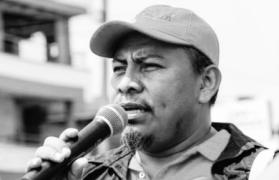The Excesses of the Constitutional Chamber in El Salvador
By Ramón Jiménez
This article was originally published on January 29, 2017 in Metrolatino USA.
The magistrate of the Supreme Electoral Tribunal (TSE) of El Salvador, Jesús Ulises Rivas Sánchez, is currently in Washington seeking that the Inter-American Commission on Human Rights (IACHR) of the OAS grant precautionary measures protecting civil and political rights and the right to freedom of expression and opinion of the Salvadoran people.
It was made known by Rivas Sánchez, who arrived this Sunday afternoon in the metro area of the United States capital, that it is a work mission which includes the presentation of a “communiqué” (lawsuit) before the commissioners of the IACHR, and that he will return to El Salvador next Wednesday.
The highest judicial authority in El Salvador is the Constitutional Chamber of the Supreme Court of Justice, but according to Rivas Sánchez, this entity has adopted legal criteria for magistrates that rejects anyone who holds a political ideology or who has sympathies for a political party, especially those on the left.
Rivas Sánchez notes that the Constitutional Chamber has removed 113 civil servants from their positions because the magistrates claim that they have or have had links to political parties. The majority of civil servants who have been dismissed do not belong to any political party.
“What is happening is that an electoral battle has begun, and the economic powers want to get back into power however they can. In our opinion, a person can have sympathy for a party, but what do the magistrates of the Constitutional Chamber do? What they say is that a person because of the fact that they have supported a presidential ticket or supported a mayor or for supporting some candidate for legislative deputy, that makes them a member of a political party,” criticized Rivas Sánchez, whose 2014 appointment is in jeopardy after a complaint of unconstitutionality, surrounding his supposed links to the FMLN (left-wing, and in government), was presented by a citizen.
“We believe that these standards are wrong, because a person during an electoral campaign has the right to think and to dissent, the right to an opinion and to support whichever electoral project that proposes a government program. How can one understand the electoral proposals of candidates and parties? Only by listening to them,” he adds.
He explains that now that there is a different government, and that it is not tied to the dictates of the economic powers, they are losing money, they are losing opportunities to make money off the State, and that the overall strategy is not just to get rid of civil servants for party links or not.
Throughout history one can see, he says, for example, that before they had the armed forces, security forces like the National Guard or the Treasury Police, at their service; after, they had the political parties, and now, they have the Constitutional Chamber.
“No one forgets that in El Salvador there are investments in education, in health, in security. It is not so much about political rivalries but instead about economic power in the country; they want functionaries to keep doing things so that they can continue their businesses in the country, that is what is behind all of this,” he notes.
Rivas Sánchez considers that things in his country have reached absurdity now that the Chamber has prohibited all public servants from attending rallies to listen to electoral proposals.
“We consider that these are violations of human rights, especially civil and political rights, because one has the right to sympathize. We accept that civil servants should not be leaders of political parties, because there could be a conflict of interest; but what will a person need to do to go to a voting booth and choose a candidate or a political party? Inform themselves. A person cannot isolate themselves from civic responsibilities, from the national life of El Salvador,” he detailed.
Rivas Sánchez indicated that if the Constitutional Chamber determines that his naming is unconstitutional – after almost three years – it would open the door for the Supreme Electoral Tribunal to be governed solely by people from the right wing.
“We would go back to a past of political intolerance. This would mean that anyone who thinks differently from the right could be stigmatized and persecuted. We are talking about something serious, because the Supreme Electoral Tribunal can make any decision with four votes, because there would only remain one who thinks differently. This is the serious part. They would take over absolute control of the Supreme Electoral Tribunal which is the governing body over elections, the public institution that ensures the democratic process,” he declared.
This article was originally published on January 29, 2017 in Metrolatino USA.

 "I am a CISPES supporter because continuing to fight for social justice and a more people-centered country means continuing the dream and sacrifice of thousands of my fellow Salvadorans who died for that vision.” - Padre Carlos, New York City
"I am a CISPES supporter because continuing to fight for social justice and a more people-centered country means continuing the dream and sacrifice of thousands of my fellow Salvadorans who died for that vision.” - Padre Carlos, New York City

